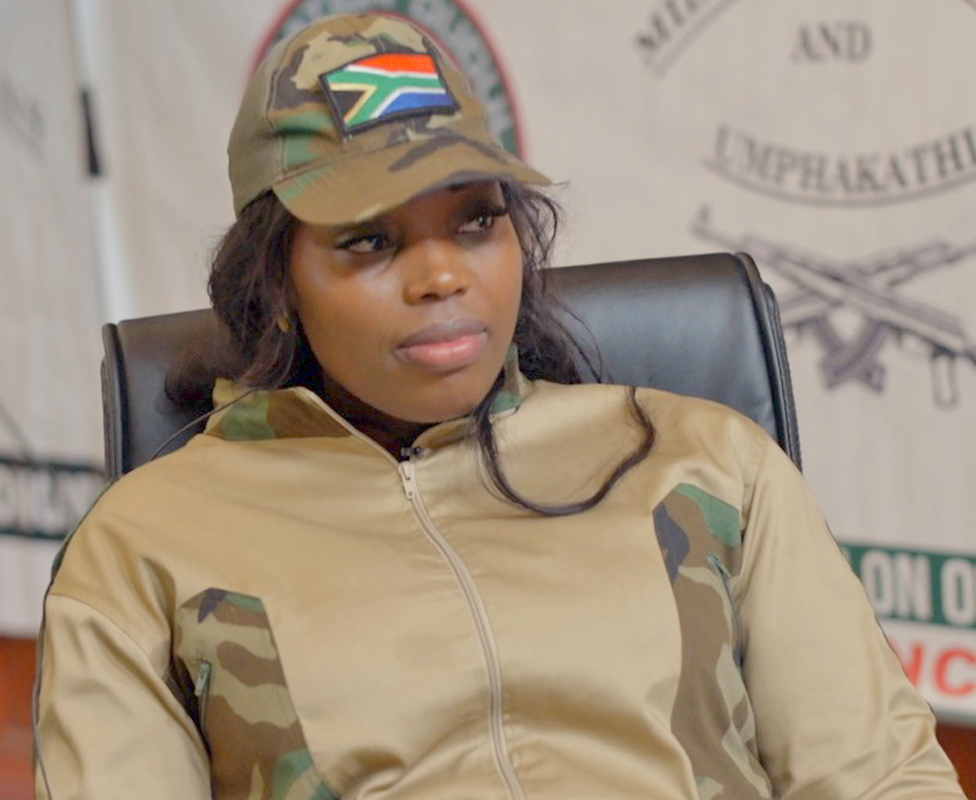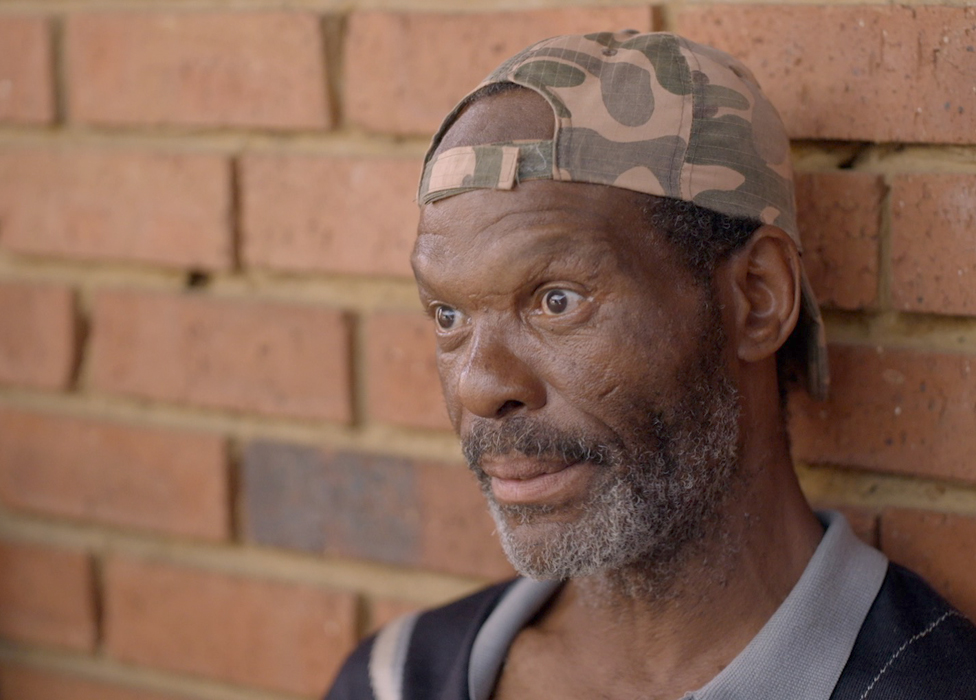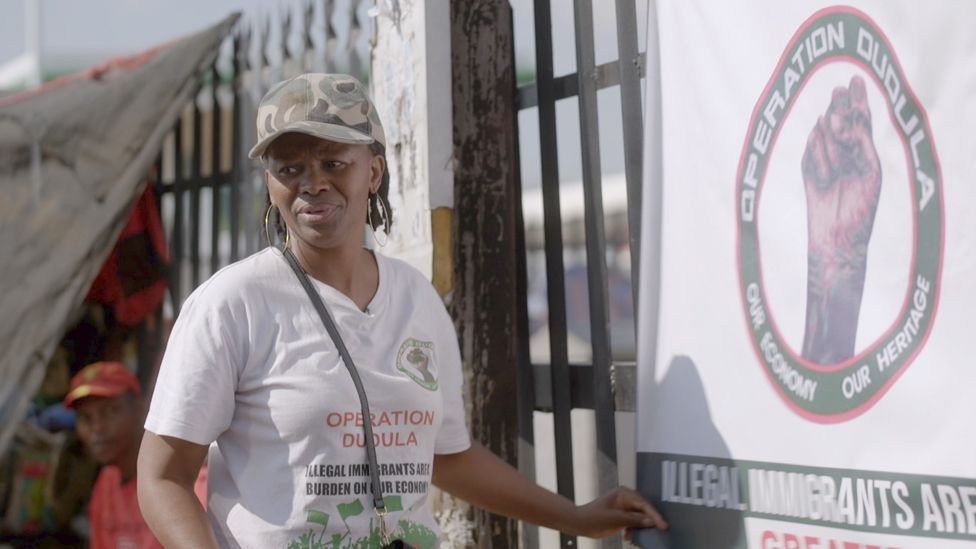South African anti-migrant group Operation Dudula has become notorious for raiding businesses belonging to foreign nationals and forcing shops to close. BBC Africa Eye has gained rare access to members of the country’s most-prominent anti-migrant street movement.
In a school kitchen in Kwa Thema, a township east of Johannesburg, Dimakatso Makoena is busy making sandwiches. The 57-year-old single parent of three has been a cook there for more than 10 years.
“To tell you the truth, I hate foreigners. How I wish they could just pack and go and leave our country,” she says, fighting back tears.
It is hard to understand the strength of this hate until Ms Makoena pulls out her phone to show a picture of her son. Emaciated with a glazed look in his eyes, angry burn scars spread over his body, up his arms and across his face.
“He started smoking drugs when he was 14 years old,” she says, explaining how her son often goes out to steal things to feed his habit. One day he had tried to take some power cables to sell when he got electrocuted and burned.
Her son uses crystal meth and nyaope, a highly addictive street drug that has devastated communities across South Africa. It is not until she blames foreigners for selling the drugs that her reasoning and support for Operation Dudula becomes clear.
“Dudula, that’s the only thing that keeps me going,” she tells the BBC.
Operation Dudula was set-up in Soweto two years ago, the first group to formalise what had been sporadic waves of xenophobia-fuelled vigilante attacks in South Africa that date back to shortly after white-minority rule ended in 1994. It calls itself a civic movement, running on an anti-migrant platform, with the word “dudula” meaning “to force out” in Zulu.
Soweto was at the forefront of anti-apartheid resistance and home to Nelson Mandela, South Africa’s first democratically elected president. Now, the township has become the home of the country’s most-prominent anti-migrant group.
With one in three South Africans out of work in one of the most unequal societies in the world, foreigners in general have become an easy target.
But the number of migrants living in South Africa has been grossly exaggerated. According to a 2022 report by the Institute for Security Studies (ISS), an independent research organisation based in the capital, Pretoria, there are about 3.95 million migrants in South Africa, making up 6.5% of the population, a figure in line with international norms. This number includes all immigrants, irrespective of legal status or where they come from.
The xenophobic rhetoric used by some public officials, politicians and anti-migrant groups has helped fuel the myth that the country is overrun with migrants. The South African Social Attitudes Survey for 2021 found that almost half of the population of 60 million people believed there were between 17 and 40 million immigrants in the country.
Current polling suggests support for the governing African National Congress (ANC), the party once led by Mr Mandela, could fall below 50% for the first time.
Operation Dudula has ambitions to fill that vacuum and has now transformed itself from a local anti-migrant group into a national political party, stating its aims to contest next year’s general election.

We must be realistic here that most of the problems that we have are caused by the influx of foreign nationals. Our country is a mess
– Zandile Dabula
Operation Dudula president
Zandile Dabula, who was voted in as president of Operation Dudula in June 2023, is calm, charismatic and emphatic about the group’s message: “foreigners” are the root cause of South Africa’s economic hardship.When it is put to her that this campaign is based solely on hate, she tells the BBC: “We must be realistic here that most of the problems that we have are caused by the influx of foreign nationals.
“Our country is a mess. Foreign nationals are working on a 20-year plan of taking over South Africa.”
When challenged on the veracity of this 20-year plan, she admits it was a rumour but says she believes it is true.
“You see drugs everywhere and most of the drug addicts are South African rather than foreign nationals. So, what’s happening? Are they feeding our own brothers and sisters so that it can be easy for them to take over?” she says.
Yet the anger meted out to migrants can be on those who are in the country legally and working in legal occupations. A Nigerian market trader, who was the target of a raid by Operation Dudula members in Johannesburg earlier in the year, tells the BBC that the two women who tasered him and destroyed his clothes by throwing them in the gutter did not stop to ask questions.
As they shot he says they swore at him, saying: “You must go to Nigeria… We are Dudula, we are South African.”
With no stock, he is now sleeping on the streets: “I vote in this country. I am a citizen here. I’ve never seen a country treating people like this. If I’m doing something illegal, fine. Deport me. But I’m not doing anything illegal. Now you make my life miserable, I can’t pay my rent. I want to go, it’s too much.”
Operation Dudula maintains it is concern over the huge influx of drugs into South Africa’s most deprived communities that is their most pressing complaint, but there is no data to back up the claim that people who sell drugs are not South African citizens.
Comparative statistics are not available for drug crimes, though the ISS report quotes the justice minister as saying that immigrants made up 8.5% of all convicted cases in 2019 and 7.1% in 2020. The ISS adds that 2.3% of inmates incarcerated each year are undocumented foreigners.
In Diepkloof, in eastern Soweto, the BBC joins a so-called Dudula taskforce. Men in trucks are going to confront a Mozambican shopkeeper who a South African landlady alleges has not paid his rent.
It is supposed to be a negotiation but quickly descends into a confrontation where one of the men, Mandla Lenkosi, threatens to beat him up. When the BBC asks them about their thuggish behaviour, they maintain they are enforcing the law.
Mr Lenkosi, also from Soweto and out of work, takes part in raids on migrant homes and workplaces, people who are suspected of anything from drug dealing to remaining in the country past their visa date.

Operation Dudula member
We grew up in apartheid times, where things were much better than what it is now”
–Mandla Lenkosi
“We grew up in apartheid times, where things were much better than what it is now,” he says, pointing to the drug problems. “The law was the law [then].”
His fellow Dudula supporter, Cedric Stone, agrees: “South Africa needs to go back to the old South Africa that we know.
“Our fathers started the tuck shops but today all those tuck shops are all foreigners, especially, Bangladeshis, Somali and Ethiopians. Why?”
President Cyril Ramaphosa has spoken out against anti-migrant protests, and condemned vigilante groups for harassing and attacking migrants. He has likened their behaviour to strategies adopted by the apartheid regime to oppress black communities.
In 2019 he launched the National Action Plan to combat racism and xenophobia, yet campaigners want the government do more.
Annie Michaels, an activist from the Johannesburg Migrants Advisory Panel, says South Africans are blaming the wrong people for their ills and should in fact admire migrants for their survival skills.
“Stop sitting and complaining and dying in that corner and waiting for the government that is failing you on a daily basis,” she tells the BBC.
“The migrants… are the poorest of the poor. They would rather go to them and rattle them, instead of rattling the cages of the guys living in the glass houses.”
For her part, Ms Dabula says critics of Operation Dudula who maintain it is a collective of violent vigilantes are wrong.
“We don’t promote violence and we don’t want people to feel harassed,” but adds: “We cannot be overtaken by foreign nationals and do nothing about it.”
Hundreds of supporters travelled to attend its first national conference in Johannesburg in May, where members voted to register the group as a political party.

Waving South African flags, dancing and singing their way through the streets to the City Hall, it feels like a celebration.
However, the songs they are singing carry a threatening message: “Burn the foreigner. We will go to the garage, buy some petrol and burn the foreigner.”
The military clothing harks back to South Africa’s liberation struggle. It all communicates a readiness for battle.
Ms Makoena is also there, smiling and dressed in her party T-shirt. “Operation Dudula is going to make history today,” she says.
On stage, Isaac Lesole, Operation Dudula’s technical adviser, has a question for the cheering supporters: “Do we make peace with illegal foreigners?”
“No,” the audience shout back in unison.
According to South African law, registering a party does not mean it will automatically qualify to contest an election – it has hoops to go through.
Operation Dudula does not have a manifesto or any policy other than its stance on foreigners, though Ms Dabula maintains it has a presence in every province except Northern Cape.
Supporters of the new party who spoke to the BBC appear to genuinely want things to be fixed in their communities. They reflect a change of mood in South Africa’s political landscape with people fed up with the status quo.
However, a toxic mix of poverty, drugs and fear has resulted in a blame game where migrants have become the scapegoats.
You can watch the full BBC Africa Eye documentary Fear and Loathing in South Africa here on the BBC Africa YouTube channel.



Leave a Reply